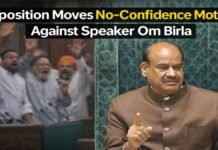
Key Points
- Home Minister Amit Shah to table three bills proposing automatic removal of PM, Union/State ministers, and CMs after 30 consecutive days in custody for serious offences.
- Rule to apply where the alleged offence carries a minimum punishment of 5 years; removal would take effect on the 31st day of custody.
- Amendments span Union Territories law, the Constitution (Articles 75, 164, 239AA), and J&K Reorganisation Act.
- Government will move to refer the bills to a Joint Parliamentary Committee for detailed scrutiny.
- Rationale: avoid governance paralysis and controversies when arrested incumbents continue in office; ensure probity and accountability in high office.
New Delhi: The Government of India is preparing a legal framework under which a Prime Minister, Union Minister, Chief Minister, or State Minister would automatically vacate office if arrested in a “serious criminal case” and held in custody for 30 continuous days. On the 31st day, the office would be deemed vacated. The key threshold is the nature of the offence: it must carry a statutory minimum punishment of at least 5 years.
The three bills at a glance
1) Government of Union Territories (Amendment) Bill, 2025
- Amends the Government of Union Territories Act, 1963 (notably Section 45) to explicitly provide for removal of a UT Chief Minister or Minister in the event of arrest and continuous custody for 30 days in a qualifying offence.
- Closes a gap where current law lacks a clear removal provision for such a situation.
2) 130th Constitutional Amendment Bill, 2025
- Proposes amendments to Articles 75 (Union Council of Ministers), 164 (State Council of Ministers), and 239AA (National Capital Territory of Delhi).
- Establishes a constitutional basis for automatic removal of the PM, Union Ministers, Chief Ministers, and State Ministers after 30 days of continuous custody in a serious offence.
3) Jammu and Kashmir Reorganisation (Amendment) Bill, 2025
- Amends Section 54 of the 2019 Act to mandate removal of the J&K Chief Minister or Minister after 30 days of custody in a qualifying offence.
The Home Minister is expected to move a motion in the Lok Sabha to refer these bills to a Joint Committee of Parliament for deeper examination and stakeholder inputs.
Why the government says it’s needed
- Current framework largely triggers disqualification from the legislature upon conviction, not during investigation or pre-trial custody.
- In practice, arrested incumbents have sometimes continued in office, creating constitutional and political friction, administrative uncertainty, and public trust issues.
- Recent high-profile examples cited in debates include instances where incumbents did not demit office immediately after arrest, prompting calls for clearer rules to prevent governance paralysis.
How “serious offence” is defined
- The bills do not enumerate specific offences.
- The operative criterion: offences that carry a minimum statutory punishment of at least five years.
- This would likely cover grave categories such as murder and certain corruption, financial, and organised crime statutes, among others.
- Determination would rest on the charge and the law invoked, not on case-by-case political discretion.
What happens on day 31
- If an office-holder has been in continuous custody for 30 days for an offence meeting the threshold, the post would be deemed vacant on the 31st day.
- The vacancy would then be filled as per the constitutional or statutory process applicable to that office (e.g., leadership selection within the majority party/coalition, swearing-in procedures, and related notifications).
- If custody ends before 30 consecutive days elapse, the automatic removal trigger would not apply.
Anticipated process and scrutiny
- Referral to a Joint Parliamentary Committee means clause-by-clause review, expert testimony, and potential drafting refinements (e.g., definitions, exceptions, safeguards).
- Key points likely to be debated:
- Civil liberties and presumption of innocence vs. probity in high office.
- The “continuous custody” test: what counts as interruption?
- Treatment of preventive detention vs. judicial custody.
- Application during states of emergency or special security situations.
- Whether bail or release automatically restores the incumbent to office or requires reappointment.
Implications for Centre, States, and UTs
- Creates uniform, predictable consequences for prolonged custody of top executive office-holders.
- Could reduce political brinkmanship around resignation demands in the aftermath of arrests.
- Places a premium on swift judicial clarity: bail decisions within the first month would carry major governance consequences.
- For Delhi (Article 239AA) and UTs, the explicit amendments would settle ambiguities that have led to institutional stand-offs.
Political and legal context to watch
- Expect constitutional debate on whether a pre-conviction removal mechanism undermines the presumption of innocence or is justified by the special responsibilities attached to executive office.
- Litigation is possible after passage, testing proportionality and due process under fundamental rights.
- State assemblies and political parties may revisit internal codes of conduct and candidate vetting, anticipating the 30-day rule.






































